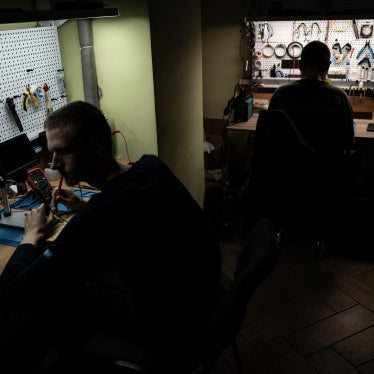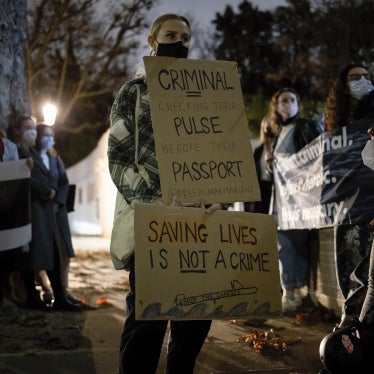The Turkish government’s plans to widen police powers are facing growing criticism at home and abroad. The government claims the draft law would merely give Turkish police the same powers as their counterparts in EU countries. The reality is that the new powers would put Turkish citizens at greater risk of state abuse.
All opposition parties, many bar associations, and human rights groups are united in a campaign against the proposed expansion of police powers in the new domestic security bill that is to come before Turkey’s parliament next week. The European Commission and the Council of Europe Commissioner for Human Rights have also raised concerns.
Human Rights Watch has multiple concerns about the bill. First, it would give the police new powers to use lethal force against demonstrators and to search and to detain people they suspect of posing a threat to public order, both without judicial oversight. Second, it would increase the criminal penalties for participating in violent or “propaganda” demonstrations, with the result that more protesters are likely to end up in pre-trial detention. Third it would grant new powers to provincial governors and deputy governors acting under government orders to direct security officials to make arrests, again bypassing the judiciary.
Prime Minister Ahmet Davutoğlu disagrees with our concerns. “Show us just one article that violates EU standards; show just one clause that is against universal democratic standards,” he said on February 10, addressing his party group in Parliament. To justify the new powers, Justice Minister Bekir Bozdağ has also argued that France, Germany, Britain and the Netherlands have similar laws.
So, do EU member states really have similar laws, and is it possible to make such a comparison between the elements in this bill and diverse examples from their jurisdictions? Human Rights Watch has learned from a diplomat of a major EU member state that in November Turkey’s Interior Ministry did indeed scrutinize that country’s police powers and cherry-pick elements from its laws to rebut criticism from the EU. Police in the UK do have powers to arrest people on their own initiative, for example, and German law criminalizes protesters covering their faces to conceal their identity, both elements of Turkey’s new draft law.
However, selective comparison with discrete police powers in individual EU member states is intentionally deceptive: it is meant to show you the tree, and hope you’ll ignore the forest. What Prime Minister Davutoğlu and Justice Minister Bozdağ won’t address is the existing state of public-order policing in Turkey. They fail to reflect on the repeated instances of violent, and unlawful, police dispersal of peaceful demonstrations and detention and prosecution of non-violent protesters. They are ignoring the sorry record of successive political authorities and courts in Turkey, which only rarely hold police accountable for entrenched abuse of duty, ill-treatment and torture.
In Turkey, given the existing context, there is a real risk, if not likelihood, that more authority to use firearms by police during protests will simply equal more citizen deaths. The record suggests that those deaths due to unjustified use of force will mostly go unpunished. Moreover, Turkey’s history suggests that giving the police the power to conduct mass arrests on their own initiative without the safeguard of judicial authorization could spell an increase in police abuse in detention and even routine arbitrary or incommunicado detention or enforced disappearances. It is a chilling prospect given the government’s track record of intolerance for dissent. It also risks taking Turkey back to the bad old days of routine unchecked police abuse.
Rather than arm themselves with such new powers – with elements carefully cherry-picked from EU member states’ jurisdictions, but without the safeguards – Justice Minister Bozdağ and Interior Minister Efkan Ala would do well to pool their efforts in addressing the concerns of the Committee of Ministers of the Council of Europe when it comes to the exercise of police powers and the right to assembly in Turkey.
Since 2006, the European Court of Human Rights has issued about 45 rulings against Turkey (identified as the Ataman v. Turkey group of cases), finding violations of the right to assembly and impunity for torture and ill-treatment, and called on Turkey to take urgent steps to address a series of detailed concerns about policing and lack of accountability. The Council of Europe Committee of Ministers will meet in March to discuss Turkey’s progress is addressing these concerns.
Giving the police a swathe of new and unfettered powers is unlikely to persuade the Council of Europe that Turkey is serious about addressing the systemic failures identified in repeated European Court judgments.
Emma Sinclair-Webb is the Istanbul-based senior Turkey researcher at Human Rights Watch.









